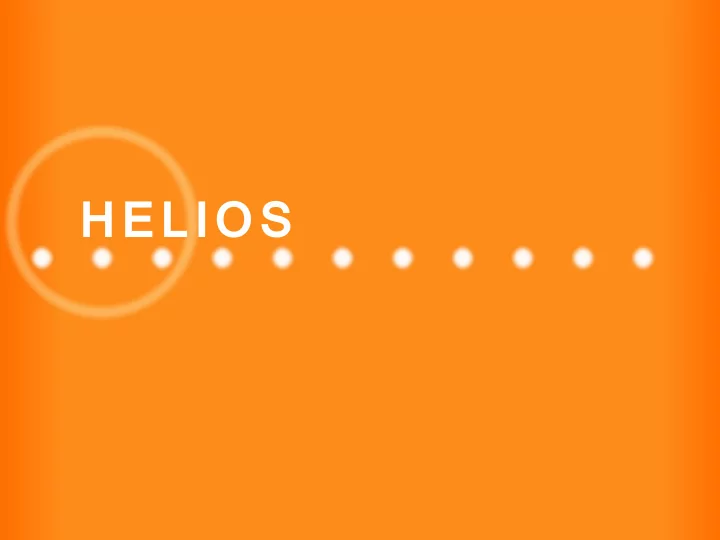

HELIOS
HELIOS A Collaborative Humanitarian Supply Chain Solution A web-based software solution that brings order to disaster relief, helping humanitarian organizations to provide aid to people more quickly and efficiently 2
Background: Timeline • Fritz Institute works with IFRC on HLS 2003 • HELIOS project was started with input from 2005 a number of agencies funded by Fritz Institute • “ Pilots ” of beta versions conducted by WVI • HELIOS v1.0 released; Oxfam joined the 2007 community 3
Background: Timeline (cont.) • HELIOS 1.1 development 2007 • Oxfam pilots and business case – 2009 • HELIOS 2.0 development • The HELIOS Foundation formed • IP transfer from Fritz Institute and Oxfam to 2010 the HELIOS Foundation • Release of HELIOS under an Open Source Licence • DFID-funded CBHA project supporting piloting of five more agencies • Oxfam commences roll-out 4
Background: Concept • Leverage information technology in humanitarian supply chain • Enable field teams to manage program supply chains as integral part of project cycle (assess – plan – implement) • Within the sector, 75% of (SCM) IT needs are the same across agencies. • Solutions should work in poor infrastructure and low IT literacy. 5
Background: Value Proposition • Increased program impact • Enhanced visibility of resource utilization • Improved use of funds and donations • Increased operational efficiency • Reduction of operating costs and lead times • Better planning and coordination of supply chain activities • Individual agency benefits multiplied if HELIOS used across organizations; leveraging 6
Background: Key Characteristics Managed Open Source Project – GNU Affero General Public License v3 – Collaborative development and maintenance – Extensible software architecture with protected core that provides standard solution for 70% of functional requirement across agencies A collaborative environment (Foundation) – Support website, issue tracker, and other community tools – Single location for all existing and future materials – ‘Best practice’ procedures, sector specific process reference models, benchmarking 7
Background: Foundation Improve efficiency and effectiveness of aid Purpose, approach and Create community; coordinate, facilitate, share objectives of the HELIOS Foundation Best practice (standard process), proven and tested technology, support materials, resources • UK-registered Charity since November 2009 • Board: Fritz Institute, Oxfam, World Vision International 8
Oxfam Issues: HELIOS as a Solution • Field teams management of supply chain: unable to efficiently manage program supply chains as integral part of project cycle • Lack of visibility: costly for the organization • Need for professionalization: standardized, consistent and effective ways of working 9
HELIOS & Oxfam: Deployment - By the end of September 2012 Helios will be Ethiopia (Addis deployed to 22 locations. Ababa, Dire Dawa, Jijiga) - Current phase of deployments focusing on HECA region Uganda (Kampala, Kitgum, Kotido) - Gateway in December 2012 to determine next round of deployments HECA RMC, Kenya (Nairobi, Lodwar and Dadaab), Somalia and Pan Africa programs Pakistan Tanzania go live September 2012 Haiti Asia RMC West Africa RMC and Liberia Indonesia Southern Africa RMC, South Africa and Zimbabwe 10
HELIOS & Oxfam: Benefits & Examples Non-Financial Benefits: • 70% of staff interviewed feel HELIOS has improved the way they work and plan together. Cross- Improved Functional Project Working Delivery Visibility to Accuracy Inform & Mgmt Tracking • >£6.4m worth of Decisions goods purchased and tracked in HELIOS during the Pakistan emergency response in 2010. 11
HELIOS & Oxfam: Benefits & Examples Financial Benefits: • £ 85,000 of stocks in Pakistan re- allocated to another project, rather than buying again. • £ 200,000 saved in Kenya by making supply plan visible and Reduction Reduction in cancelling over-ordering. in Transport Supply Chain Costs Waste Reduction in Increased Supply Donor Chain- Compliance Related Fraud 12
HELIOS & Oxfam: Benefits Summary FY 10-11 FY 11-12 TOTAL Stock Utilization £ 464,961 £ 425,856 £ 890,817 Asset Utilization £ 69,167 £ 239,007 £ 308,174 TOTAL £ 534,128 £ 664,863 £ 1,198,991 13
Collaboration: Other Agencies Contributing agencies: – WVI, IMC, Merlin, MSF, Oxfam – CBHA: Tearfund, Save UK, Concern, IRC, Merlin Sponsors & donors: – Fritz Institute, ECHO, DFID, Intel, Microsoft 14
Other Agencies: Barriers Agencies find HELIOS has good functional scope and fit for purpose, but… Product comments: – Application needs to be more flexible/ intuitive – Low bandwidth performance to improve – No business integration service available – Questions about sustainability and product development under ‘open source’ Reality: – Agencies need to prioritize operational spending over systems investment – Limited IT skill & capacity make it difficult to engage in project – Internal competition for resources 15
Current Priority: Development Product development should make deployment easier and bring down engagement barriers for agencies. – Reduce deployment cost – Scalable engagement for new agencies – Easily configurable – Low - maintenance technology 16
Development Targets Usability improvements should allow users across functions in projects, often with low ‘IT literacy’ to interact easily with the system. – Intuitive UI – Workflow (includes offline working and use of handheld devices) Performance improvements negate the challenging conditions for HELIOS in remote locations. – Responsive (consistent low response times) – Fast (current speed x 1.5) – Light (bandwidth) 17
HELIOS Foundation as a Knowledge Center HELIOS Foundation maintain resource website used by many agencies, regardless of their interest for the HELIOS software. Sector process reference models and other common tools will help prevent duplication of effort and promote ‘best practice’ standard. Opportunities for collaboration on related process issues such as performance management, KPI, benchmarking 18
HELIOS as a Service Organization Product Support Deployment Service 1) Data Migration Training Tier 1 & Tier 2 Product Management Support Business & Technical Consultancy User Acceptance Testing (UAT) Tailored Training Materials Demo / Test Hosting Software as a Service (SaaS) 2) Maintenance Support Site Issue Tracker ID001 Source Control ID002 ID003
Recommend
More recommend